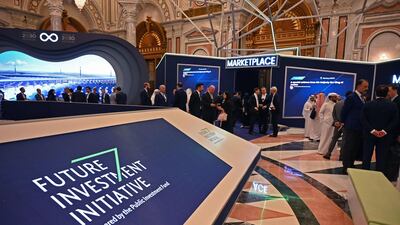Mubadala Investment Company is repositioning its portfolio as it monetises mature assets and pivots to technology sectors as Abu Dhabi’s strategic firm prepares for a potential global correction amid rising economic uncertainty, its top executive said.
"We are monetising assets that we feel have reached the stage of maturity and returns … it's a good market right now but we are also shifting to new areas of life sciences, biotech, agri [technologies]," Khaldoon Al Mubarak, the managing director and group chief executive of Mubadala, said. "And again, from these sectors, we are also preparing for a correction that's going to come …. I don't know when that's going to come [though]," he told the delegates at the third Future Investment Initiative summit in Riyadh on Tuesday.
Uncertainty, whether stemming from geopolitical issues, economy and trade wars, or from the technologies disrupting conventional businesses, has been on the rise, he noted, adding that the for the past 15 years there has been a gradual escalation in uncertainty.
"The future is going to be more of the same … increase in uncertainty," Mr Al Mubarak said.
With global financial markets showing signs of heightened uncertainty, investors have to look where the opportunities are, and Mubadala has a portfolio which, over the past 20 years, it has “tried to shift, navigate and pivot through the uncertainty”.
In the short term, Mubadala is looking at mechanisms to invest with downside protection, which will give the company ability to navigate through potential downturns.
“However, we are designed to take a long-term view and when you’re programmed to take a long-term view that helps you manage that uncertainty with a bit more comfort,” he said.
Mubadala, which manages more than Dh841 billion in assets, invests on behalf of the Abu Dhabi government across sectors and its international investments include stakes in General Electric, private equity company Carlyle Group, Austria’s oil and gas entity OMV, and petrochemicals manufacturers Borealis and Nova Chemicals.
Earlier this month, the company completed a deal to sell a significant minority interest in its fully-owned Spanish oil and gas company Compania Espanola de Petroleos (Cepsa) to Carlyle Group in the US. Mubadala will remain the majority shareholder of Cepsa with a 63 per cent stake, while funds affiliated with Carlyle will have a 37 per cent stake, Mubadalaa said.
Increasingly, the company is turning to technology and emerging technology sector investments.
Mubadala is a cornerstone investor in SoftBank Group’s $100bn (Dh367.25bn) Vision Fund, with a $15bn commitment. The company last year also rolled out a $400 million fund to invest in European tech companies.
Mubadala sees the potential of establishing venture capital capabilities in places such as London and Paris to look for investments in tech sector companies.
“This is a space I see growing,” he said. “Be very well versed in language of AI and other disruptive technologies companies that are coming up all over the world ... I think that is an absolute necessity.”
Despite rising uncertainty, Mr Al Mubarak said he still sees long-term potential in the US market.
“We remain long on United States,” he said.
Mubadala, Mr Al Mubarak said, is also taking a long-term view on China and that regardless of what happens with the trade war, or on the geopolitical side, there is a tech race between the world’s two biggest economies that is not going to end for the next 100 years.
"From an investor's perspective there are great opportunities in US and there are great opportunities in China," he said. "I'm very excited about what I'm seeing in China."




















